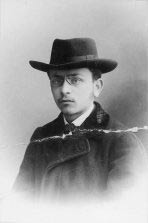|
Though his entire oeuvre consists of only eleven published poems, Avraham Ben Yitzhak is a legend in the history of Hebrew poetry and one of its most admired figures. Born Abraham Sonne in Galicia (Poland) in 1883, he received a traditional Jewish education, then went on to study in Berlin and Vienna, making the latter his home for the better part of the first three decades of the new century. With the Nazi invasion of Austria in 1938, he fled and took up residence in Palestine. His friends in Vienna included Hermann Broch and Elias Canetti, who regarded him as an object of wonder. Canetti wrote about Sonne at length in his memoirs, calling him a Musil-like “man without qualities.” (This detailed portrait of Sonne was published in the New Yorker.). He revered him and considered him his mentor: “What was it about Sonne,” Canetti asked, “that made me want to see him every day, that made me look for him every day, that inspired an addiction such as I had never experienced for any other intellectual?” Nine of Ben Yitzhak’s poems were written before the First World War and were published in Hebrew journals; the final two—widely acknowledged as masterpieces in the Hebrew canon—appeared somewhat later, twelve years apart. This bilingual collection contains all of Ben Yitzhak’s canonical poems, as well as a selection of unpublished work from the archives. Translated by Peter Cole, the poems are annotated by Hannan Hever, the leading authority on Ben Yitzhak. The book also includes an afterword by Hever, which presents a striking portrait of the man whose “meager output” — in the words of the poet Lea Goldberg — “accomplished more for Hebrew literature … than ten thick volumes by other poets.”
AVRAHAM BEN YITZHAK was born in Przemysl, Galicia (Poland) in 1883 and died in Israel in 1950. HANNAN HEVER is Professor of Hebrew Literature at the Hebrew University in Jerusalem. He has published numerous studies of modern Hebrew literature, including a monograph on the poetry of Avraham Ben Yitzhak and Poets and Zealots: The Rise of Hebrew Political Poetry in Eretz Israel. Producing the Modern Hebrew Literary Canon: Minority Discourse and Modern Hebrew Fiction was published last year by NYU Press. PETER COLE’s most recent book of poetry is Hymns & Qualms. He has received numerous awards for his work, including the 2001 Times Literary Supplement–Porjes Prize for his Selected Poems Available from Adraba Books, Jerusalem: adraba@adrababooks.co.il |

